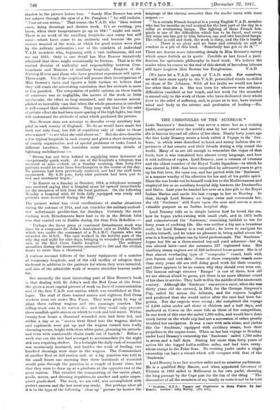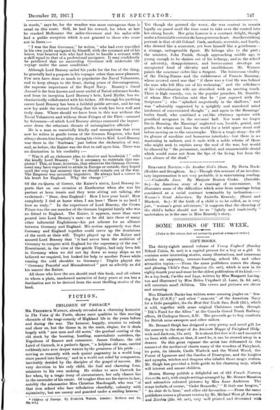THE CHRONICLES OF THE SUNBEAM." , Loan BRAUER'S ' Sunbeam '
was never a racer, but as a cruising yacht, navigated over the world's seas by her owner and master, she is famous beyond all others of her class. Nearly forty years ago the first Lady Brame), wrote a book called A Voyage in the ' Sun. beam,' in which were described in frank and sunny fashion the ex- periences of her owners and their friends during a trip round the world. Many of us are old enough to remember the vogue of that book, how it was translated into almost every language, and how it sold millions of copies. Lord Brassey, now a veteran of veterans and the oldest member of the Royal Yacht Squadron—to which he was elected in 1859—has been compelled by advanced years to give up his first love, the open sea, and has parted with the ' Sunbeam in a manner worthy of his affection for her and of his public spirit. Since the war broke out he himself took her to the Mediterranean and employed her as an auxiliary hospital ship between the Dardanelles and Malta. Last year he handed her over as a free gift to the Royal Indian Marine and made his last voyage in her to Bombay. So that, though Lord Brassey no longer owns and commands her, the old Sunbeam ' still floats upon the seas and serves a most valuable purpose as an Indian hospital ship.
Lord Brassey tells us in simple fashion how he loved the sea, how he began yacht-owning with small craft, and in 1875 built and commissioned the ` Sunbeam,' remaining faithful to her for forty years of yachting life. She was neither a big nor a luxurious craft, for Lord Brassey is a real sailor ; he loves to navigate his yachts himself, and he takes no pleasure in being sailed about the sees in a floating palace run by hired professionals. The ` Sunbeam' began her life as a three-masted top-sail yard schooner—her rig was altered later—and she measures 227 registered tons. Her auxiliary steam engines are of 350 indicated horse-power. She is of that almost everlasting type of " composite " vessel, built with iron frames and teak skin. Some of these composite vessels more than sixty years old are still doing good work for their country, and there appears to be no reason why they should over wear out. The famous salvage steamer ` Ranger ' is one of these, how old we are almost afraid to guess, yet there is no more efficient vessel of her class in service. They built well in the middle of the nineteenth century. Although the ` Sunbeam ' was never a racer, when she was thirty years old she entered, in 1905, for the German Emperor's Cup, sailed for across the Atlantic), and the experts laughed and predicted that she would arrive after the race had been for- gotten. But the. experts were wrong ; she completed the voyage of 3,080 miles under sail alone in thirteen and a half days-, and anchored at Cowes on the same tide as three of her competitors. In one week of thie race she sailed 1,900 miles, and would have done much better on the whole trip had not a succession of calms greatly troubled her navigators. It was a race with sails alone, and yachts like the ' Sunbeam,' equipped with auxiliary steam, bore their propellers in the engine-room. When on her last voyage to Bombay under Lord Brassey's ownership the ' Sunbeam' sailed 1,700 miles in seven and a half days. During her more than forty years of active life she logged half-a-million miles, and had been every- where except In the Polar Seas. No cruising yacht under a single ownership can have a record which will compare with that of the ' Sunbeam.'
Lord Bressey is no fair-weather sailor and no amateur yachtsman He is a qualified Ship Master, and when appointed Governor of Victoria in 1895 sailed to Melbourne in his own yacht, ohoosing the long passage by the Cape just for the fun of the thing " The discomfort of all the members of my family en routs is not to be told
*•Sumbswa,' l'agN and Rsparintas is Many Wales. By Earl
Jimmy. London : John Murray. 121'. net.' in words," says he, for the weather was more outrageous than is usual on this route. Still, he had his reward, for when at last he reached Melbourne the sailor-Governor and his sailor-wife had a public reception which is not granted to those who come out in liners :- " I was the first Governor," he writes, " who had ever travelled in Ids own yacht navigated by himself, with the constant aid of his brave, true-hearted wife who had learnt to handle a sextant with a skill equal to that of a professional navigator. It may confidently ho predicted that no succeeding Governor will undertake the voyage under the same conditions."
Although Lord Brassey sailed his yacht for the fun of the thing, he generally had a purpose in his voyages other than mere pleasure. Few men have done so much to popularize the Naval Volunteers, and to keep always to the front, during years of discouragement, the supreme importance of the Royal Navy. Brassey's Naval Annual is the best known and most useful of Naval reference-books, and from its inception Lord Brassey's heir, Lord Hythe, has en- thusiastically collaborated with his father. All through his yachting career Lord Brassey has been a faithful public servant, end he can now by aside the sextant fooling that his work has been well and truly done. Where should we have been in this war without the Naval Volunteers and without those Fringes of the Fleet—manned by fishermen—of which Lord Brassey always crammed the import- ance down the reluctant throats of unimaginative officials ?
Ile is a man so essentially kindly and unsuspicious that even now he write. in gentle terms of the German Emperor, who had always shown hint hospitality during his visits to Kiel. Lord Brassoy was there in the ' Sunbeam' just before the declaration of war, and, as before, the Kaiser was the first to call upon him. There was no diminution in his cordiality :- " Was it all an elaborate plan to deceive and hoodwink 1" asks the kindly Lord Brassey. " Is it necessary to entertain this sus- picion? This, at least, is certain, that whatever the German Govern- ment may have expected to attain in Europe or outside, they hoped until the very last moment that we should remain out of the war. The Emperor was naturally impulsive. He always had a corner in his heart for England. Why the change ! "
Of the ex-Queen of Greece, the Kaiser's sister, Lord Brassey re- ports that on one occasion at Eastbourne when she was his partner at lawn tennis and they were sitting out talking, she exclaimed: " Dear, dear England ! How I love your land! How completely I feel at home when I am here ! There is no land I love so truly." In the experience of Lord Brassey, the Crown Prince was the one member of the Gorman Imperial family who was no friend to England. The Kaiser, it appears, more than once poured into Lord Brassey's ears—as he did into those of many other influential Englishmen—his pet scheme for an alliance between Germany and England. His notion apparently was that Germany and England together could carve up the dominions of the earth at their will. Tirpitz played up to the Keiser and assured Lord Brassey that " it had never been the ambition of Germany to compete with England. for the supremacy of the sea." Resentment, in the view of the gentle Tirpitz, had only been felt in Germany when we did not lay down as may ships as we believed we required, but looked for help to another Power while turning the cold shoulder to Germany ! Tirpitz played the Germany Peaceful and Misunderstood " part as adroitly as did his master the Kaiser.
All those who love the sea should read this book, and all others to whom a plain, unadorned narrative of forty years at sea hes a fascination not to be derived from the most thrilling stories of the land.



























 Previous page
Previous page